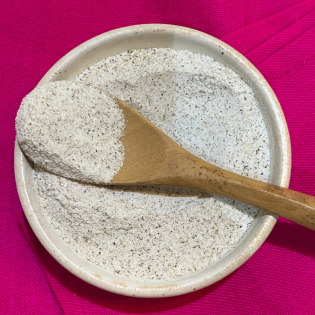Buckwheat

Buckwheat flour (kuttu ka atta) is used for fasting. Buckwheat has the appearance of small, nugget-type granules that can be used in the same way as rice. Buckwheat contains a decent amount of fiber and plant compounds with antioxidant properties which may help support heart health and reduce blood sugar. It may cause allergic reactions in some people. Buckwheat has become popular as a health food due to its high mineral and antioxidant content. Its benefits may include improved blood sugar control.
Nutritional content of Buckwheat (100g) -
- Calories: 343
- Protein: 13.3 grams
- Carbs: 71.5 grams
- Fiber: 10 grams
- Fat: 3.4 grams
Improves heart health -
- Buckwheat may also promote heart health. It boasts many heart-healthy compounds, such as rutin, magnesium, copper, fiber, and certain proteins. Among cereals and pseudocereals, buckwheat is the richest source of rutin, an antioxidant that may have a number of benefits. Rutin may cut your risk of heart disease by preventing the formation of blood clots and decreasing inflammation and blood pressure. Buckwheat has also been found to improve your blood lipid profile. A poor profile is a well-known risk factor for heart disease.
Improves blood sugar levels -
- As a good source of fiber, buckwheat has a low to medium GI. This means that it should be safe to eat for most people with type 2 diabetes. In fact, studies link buckwheat intake to lower blood sugar in people with diabetes. This is supported by a study of rats with diabetes, in which buckwheat concentrate was shown to lower blood sugar levels by 12–19%. This effect is thought to be due to the unique compound D-chiro- inositol. Studies indicate that this soluble carb makes cells more sensitive to insulin, the hormone that causes cells to absorb sugar from your blood.
Gluten-free -
- Buckwheat is naturally gluten-free, making it suitable for those with coeliac disease. However, if avoiding gluten is important for you, make sure you check labels when purchasing buckwheat products. This is because some commercial products such as soba noodles may be made using buckwheat combined with wheat and therefore will not be gluten-free.
High fiber content -
- Buckwheat is rich in fibre, especially insoluble fibre and a type known as resistant starch, both of which are of particular benefit to gut health. This is because the beneficial bacteria that live in the gut use these fibres as a source of fuel, helping them increase in number and simultaneously produce by-products that are valuable for gut health.
Rich in antioxidants -
- Buckwheat has an enviable antioxidant profile, better than that of many common cereal grains like oats or wheat. As well as containing plant compounds like rutin, it is one of the richest food sources of d-chiro inositol.
- Buckwheat is naturally gluten-free, so could prove a particularly useful grain for anyone with coeliac disease or an intolerance to gluten, however check labels if this applies to you as some foods can add wheat into the mix. Its antioxidant profile is better than many common cereal grains, which may help to protect against cell damage. Packed with heart-healthy nutrients, buckwheat is also high in fibre, which may benefit gut health and help you to feel full.


